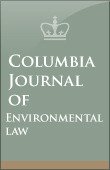 My latest law review article has just been published: “Atmospheric Intervention? The Climate Change Crisis and the Jus ad Bellum Regime,” 45 Columbia Journal of Environmental Law 331 (2020). Here is the abstract:
My latest law review article has just been published: “Atmospheric Intervention? The Climate Change Crisis and the Jus ad Bellum Regime,” 45 Columbia Journal of Environmental Law 331 (2020). Here is the abstract:
Many governments have begun to understand that the consequences of climate change will increasingly create both direct and indirect threats to national security. Under some projected scenarios these consequences may pose an existential threat to human civilization. Yet there has been little attention to how this will implicate the jus ad bellum regime. As the climate change crisis becomes more severe, states will begin to view not just the consequences but some of the causes of climate change as comprising a threat to national security. Specifically, they will begin to characterize other states’ recklessly excessive and flagrantly unlawful contributions to climate change as a threat to international peace and security. The international climate change regime will be sufficiently developed to help frame such characterizations, but incapable of enforcing or mobilizing compliance with its obligations.
States will thus look to the collective security regime to coerce such “climate rogue states” to comply with their climate change law obligations. The identification of climate rogue states as posing a threat to international peace and security will trigger the basis for collective action, up to and including the threat or use of force. In the face of UN Security Council inaction, there will be increasing pressure on the jus ad bellum regime to adjust so as to permit and justify such action. Recent efforts to relax the constraints of the jus ad bellum regime, in response to other purportedly novel threats — such as nuclear proliferation, transnational terrorism, cyber-attacks, and humanitarian crises — provide templates for the kind of arguments we may anticipate for justifying action against “climate rogue states.” We will see efforts to expand the doctrine of self-defense, or to establishing new exceptions to permit “atmospheric interventions.”
The logic of these arguments for adjusting the jus ad bellum regime are more powerful than recent efforts, because the threat they seek to address will increasingly appear to outweigh the resulting increased risk of armed conflict. They will likely gain traction as the crisis deepens. This requires us now, before fear drives the agenda, to begin a discussion of how such adjustment might best be shaped, limited, or resisted. As compelling as they will become, the arguments are dangerous. They will not only weaken the jus ad bellum regime but are likely to compound some of the injustices of the climate change crisis and undermine the international rule of law in ways that will be counterproductive to our efforts to respond to the crisis.
